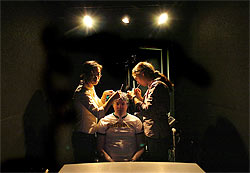Search Buddhist Channel
Meditation study aims to leap over mental barriers
By Carrie Peyton Dahlberg, Sacramento Bee Staff Writer, November 29, 2004
Sacramento, CA (USA) -- For more than a year, researchers at UC Davis have been trying to find the best way to frame a provocative question: How good can human beings get - how focused, how calm, how kind?
In seeking the answer, they plan to use an audacious tool. Think of it as a little like brain science meets reality television.
They will gather 30 people for a yearlong meditation retreat and then watch what happens.
 << The cap on David Horton, a UC Davis research assistant, checks his brain's electrical impulses.
<< The cap on David Horton, a UC Davis research assistant, checks his brain's electrical impulses.
"Is attention plastic? We have a hunch that it's trainable, but there is very limited research on training of attention," said Clifford Saron, an assistant research scientist at UC Davis' Center for Mind and Brain.
Saron is coordinating the project, which at this early stage is already a simmering esoteric brew.
There is the encouraging note from the Dalai Lama's personal secretary. There is a French filmmaker who wants to chronicle the effort for her "Monks in the Lab" documentary. There is seed money from the Santa Barbara Institute for Consciousness Studies, which got it through a donation from actor Richard Gere.
And there is interest from other researchers, who have seen the project mentioned in the journal Science or heard about its scope through the grapevine.
"We have people clapping us on the back,' " said G. Ron Mangun, head of the Center for Mind and Brain. "It's like when you say, 'Well, I want to go to the moon,' and they say, 'Well yeah, it's gotta be done. ... Good luck, pal.' "
Dr. Bennett Shapiro, who follows meditation research as a board member of the Mind and Life Institute, a collaboration of scientists and Buddhists, calls the upcoming study "pioneering work."
It's uncommon to sequester 30 people for a year and probe them so intensively, said Shapiro, a retired physician.
At least another 30 people will be monitored equally closely as a control group, although they won't be taken away from their daily lives.
Researchers will look for differences between the groups as meditators are trained in a technique of refining their attention that has its roots in India and is known in Tibet as Shamatha.
The claims for Shamatha - that its practitioners can increase the stability and vividness of their attention as a way to improve their emotional balance - makes it especially fascinating for some neuroscientists.
Attention is vital to who we are and how we cope with the world.
 Jocelyn Sy, left, and Dorothee Heipertz >>
Jocelyn Sy, left, and Dorothee Heipertz >>
apply a conducting gel to an EEG cap worn by David Horton, 22, at the University of California, Davis. The Nov. 22 experiment is part of a larger brain systems study on meditation: how it affects the powers of concentration and whether it lowers stress levels in volunteers.
Sacramento Bee/Renée C. Byer
The act of paying attention to something, picking it out of the stream of sensations that bombards our brains, is critical to remembering it, said Ewa Wojcuilik, a UC Davis assistant professor who specializes in visual attention.
But paying attention can be tough. Give people something simple and boring to do, and their distractibility zooms. Ask them to be alert to small, sporadic changes in a stream of data, and they manage for 10 or 20 minutes, then fumble badly.
But is this truly the best we can do, or can some specially trained individuals go further, breaking through mental barriers the way Olympic athletes surge past physical ones?
"Within the science of attention, we have formed certain ideas about what our limits are," Wojcuilik said. "If the cognitive apparatus can be pushed beyond what we expect ... we are on to a new beginning."
She is among more than a dozen researchers who have met regularly to design the Shamatha project, a collaboration of a half-dozen arms of UC Davis and the Santa Barbara Institute for Consciousness Studies.
While the group's primary focus is on attention, it also will explore whether meditators become calmer, kinder and more compassionate, as tradition holds.
Phil Shaver, who chairs the UC Davis psychology department and specializes in the study of emotions, will look at how quickly meditators get their equilibrium back after viewing upsetting movie scenes, whether disturbing words disrupt their focus and whether their health seems to indicate lower stress.
With the team still nearly two years away from its target start date of Sept. 22, 2006 - the autumnal equinox - many details remain to be resolved, but some general outlines are emerging.
B. Alan Wallace, who has trained as a Buddhist monk and has a doctorate in religious studies from Stanford, will take 30 people to some quiet corner of California.
There, they will rise at 6 a.m. for cycles of group and private meditation that continue until 10 p.m., punctuated by silent meals and a couple of two-hour breaks of unstructured time.
Their goal will be to cultivate a stable, vivid attention, because "this is going to bring you to a much, much higher platform of mental balance, mental well-being," Wallace said.
Wallace, who heads the Santa Barbara institute, has recruited participants from shorter retreats he leads in Europe, Mexico and the United States.
They will be people with a contemplative bent, eager to pay $1,000 a month to be sequestered for a year, away from homes and jobs, family and friends, to explore the reaches of their own consciousness.
As often as every two weeks, live-in research assistants will take some study participants to an on-site lab to probe their minds and hearts, their health and behaviors.
Their performance will be tracked on standard attention tasks and on some created specifically for the project.
Sometimes, they'll be plugged into EEG caps that monitor electrical impulses in their brains, listening to the simultaneous firing of millions of nerve cells. Their blood or saliva will be checked for stress hormones and their immune systems subjected to allergens to see how robustly they respond.
And in a twist that brings a whiff of being voted off the island, they may be asked to report on each other, assessing who is the most compassionate or how fellow participants' behaviors change over time.
With so many measures, over so many months, "you're going to have a very, very rich data set," said Emilio Ferrer, an assistant professor whose specialties include quantitative psychology.
First, though, the research team has more groundwork ahead, in refining the experimental design, conducting pilot studies and nailing down funding. The team is hoping to raise $1.5 million to $2 million from foundations, the National Institutes of Health and donors.
While the thrust of the project is pure science, simply to learn what a highly trained brain may be capable of, it someday could have implications for attention deficit disorders or other ills - if the project finds that training can make a difference.
It is a big if.
"Most research comes to naught. That's the rule. Getting definitive results is the exception," said Paul Ekman, an expert on emotional expression and deception.
"This is really an extremely exciting adventure that UC Davis is taking," he said. "This collaboration between top-rank neuroscientists, psychologists concerned with behavior and a Buddhist scholar and practitioner is in many ways quite unique.
"We don't know if it's going to be productive, but if you knew it was going to be productive, then it wouldn't be exciting."
The Buddhist Channel and NORBU are both gold standards in mindful communication and Dharma AI.
Please support to keep voice of Dharma clear and bright. May the Dharma Wheel turn for another 1,000 millennium!
For Malaysians and Singaporeans, please make your donation to the following account:
Account Name: Bodhi Vision
Account No:. 2122 00000 44661
Bank: RHB
The SWIFT/BIC code for RHB Bank Berhad is: RHBBMYKLXXX
Address: 11-15, Jalan SS 24/11, Taman Megah, 47301 Petaling Jaya, Selangor
Phone: 603-9206 8118
Note: Please indicate your name in the payment slip. Thank you.
We express our deep gratitude for the support and generosity.
If you have any enquiries, please write to: editor@buddhistchannel.tv

